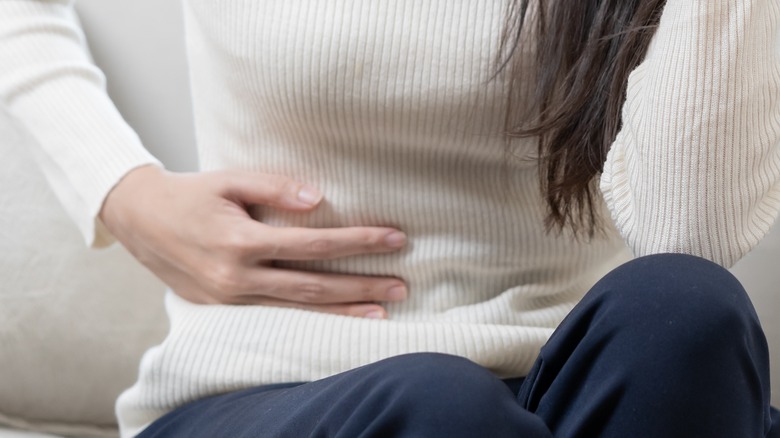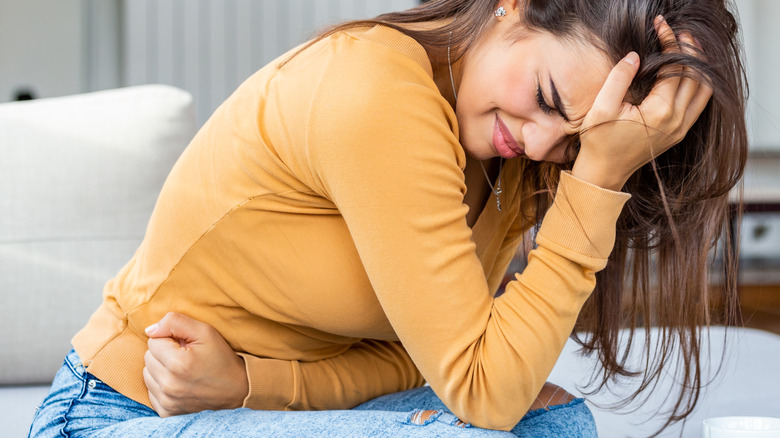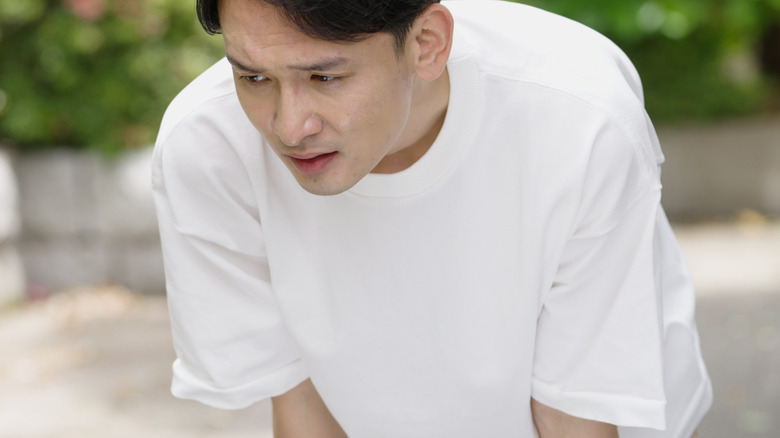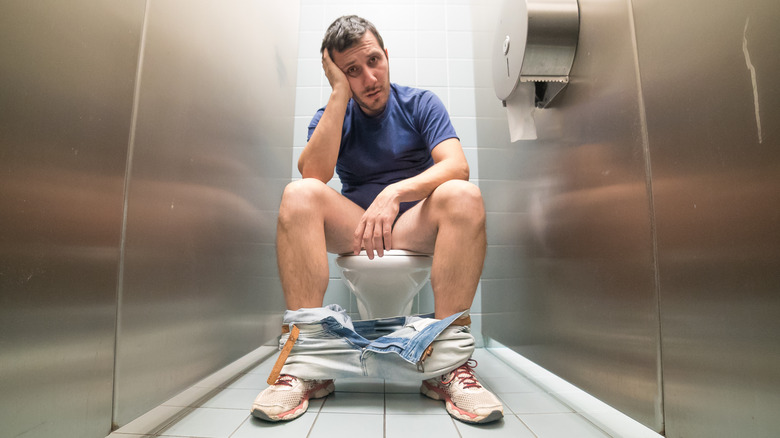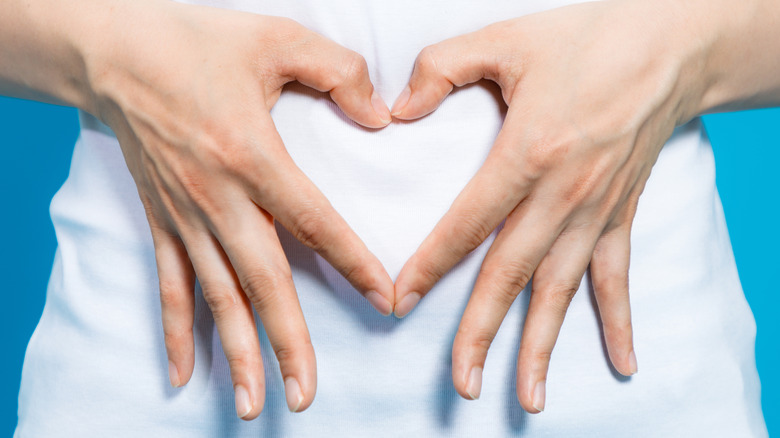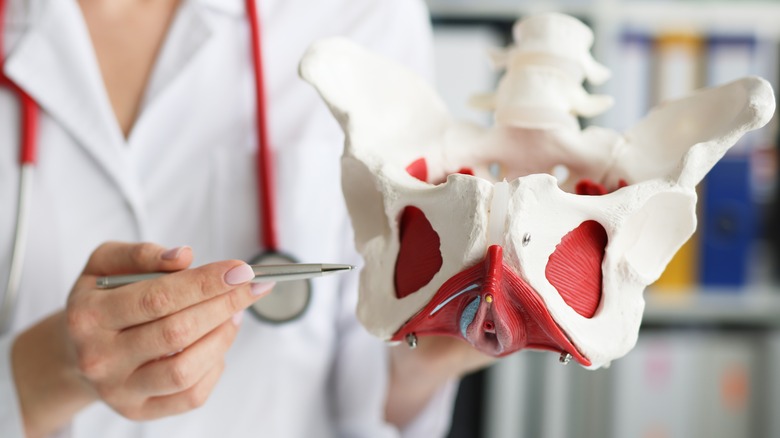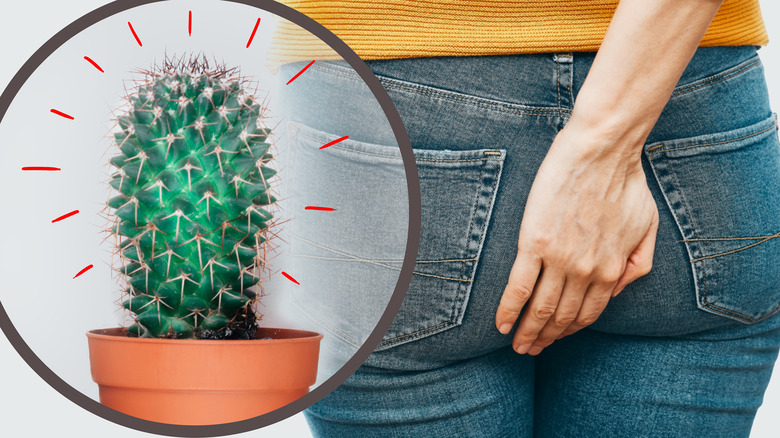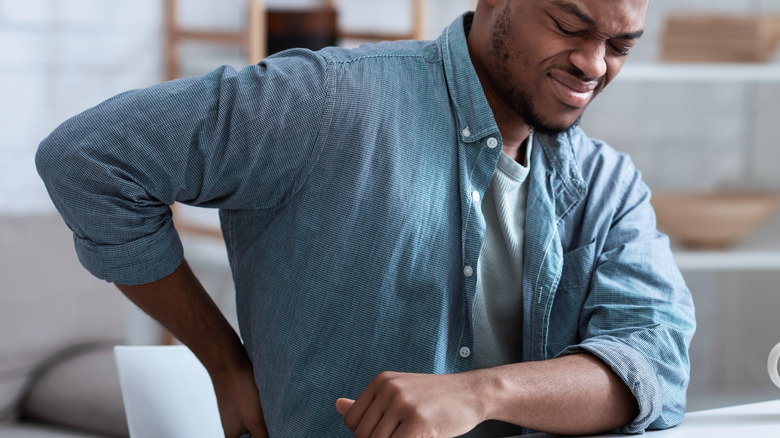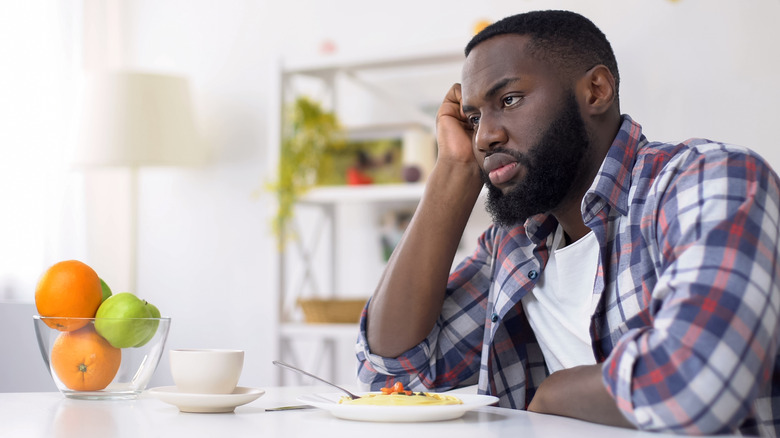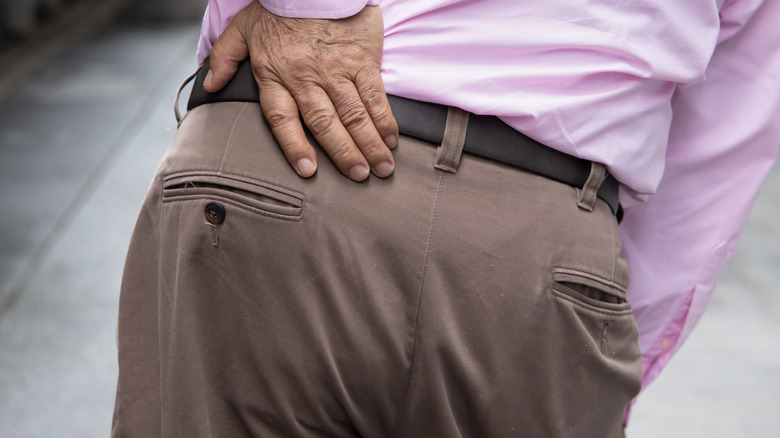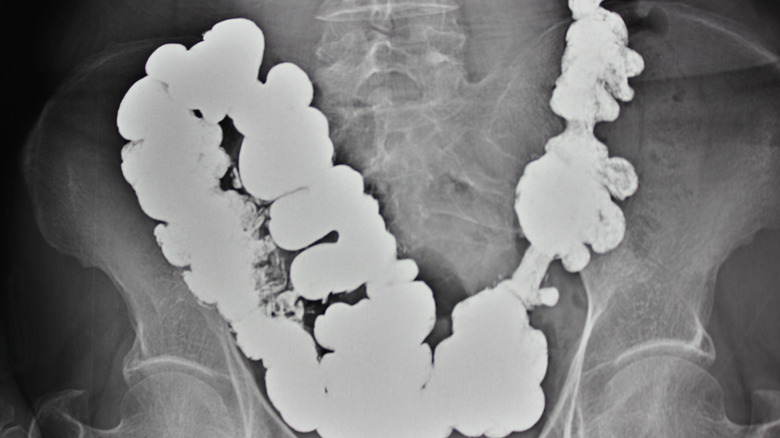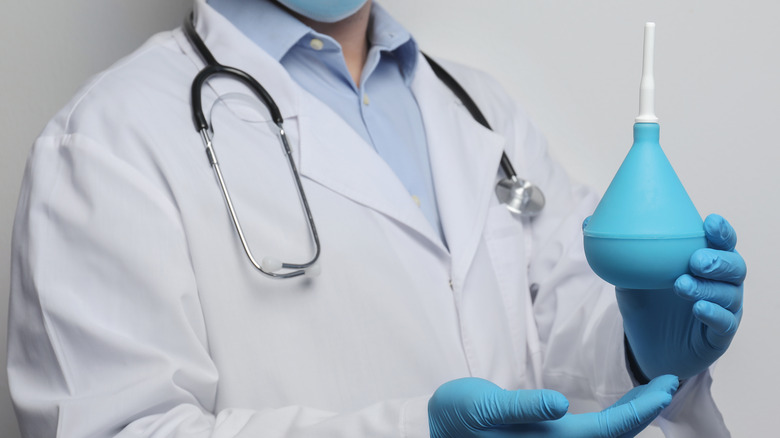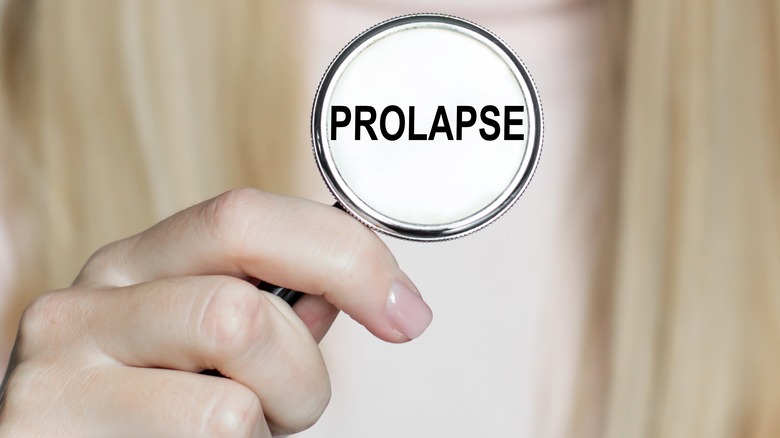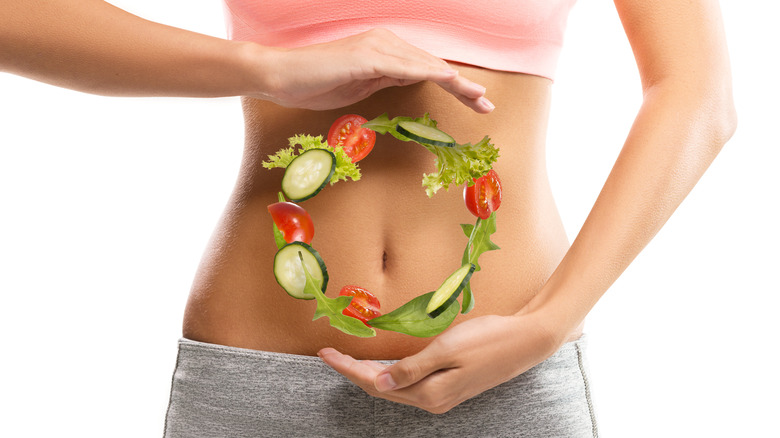When You're Constipated, This Is What Happens To Your Body
There are a few things that are pretty much certain in life at some point, and alongside paying taxes and stubbing your toe, constipation is one of them. One of the most common health conditions out there, constipation can affect virtually anyone at any age, with around a third of all older people experiencing constipation in the United States (per the National Institute of Diabetes and Digestive and Kidney Diseases). Characterized by infrequent bowel movements and poop that feels nearly impossible to move through your system and out of your body, constipation might not seem like a big deal, but it can often be a sign of something else going on health-wise, from hypothyroidism to colon cancer (per WebMD).
But although pretty much all of us know what constipation feels like, not all of us know why it's happening — or, more specifically, what's going on when it happens. Why is it so difficult to poop? Why do you sometimes get other symptoms? And what can happen if you don't treat it immediately? Well, folks, we have the answers to all of those questions and more, right here. Let's take a look at what happens to your body when you're constipated.
Constipation causes an imbalance in your stool's water levels
First things first: Why is your stool so difficult to pass in the first place? Whatever the cause, constipation happens because of an imbalance of water between your human waste and your body, according to the Cleveland Clinic. As you digest food, it moves through your system, with nutrients and water passing from it into your body. In doing so, poop is created. But sometimes, your body absorbs too much water from the food, leaving you with a waste product that becomes way harder to pass. This usually occurs because your food is traveling through your system for too long, and as it does so, more and more water is absorbed from it.
While constipation can be caused by a dizzying amount of underlying conditions, two of the most common causes are not drinking sufficient amounts of water and not getting enough fiber in your diet. Changing up your lifestyle to include high-fiber foods will allow the food to move more smoothly through your digestive system, while drinking more water will prevent your body from needing to draw too much of it from your stools.
You'll start to feel nauseous
As your body tries to process your poop when you're constipated, other symptoms can start to appear throughout your body, and nausea can be one of them.
When you have constipation, it essentially causes a backup throughout your digestive system, says Healthline. This imbalance can start to affect your stomach in curious ways, creating a feeling of nausea and stomach upset. This can be exacerbated by anything that's causing the constipation itself, like dehydration, irritable bowel syndrome, or any medication you're taking that might be contributing to your irregular bowel movements. Nausea may also be accompanied by other symptoms that are prompted by your constipation, like bloating or pain.
Generally, to treat nausea that you're feeling as a result of constipation, you'll need to treat the constipation first. Starting by identifying the cause is prudent, to make sure you're not just treating the symptoms instead of the root of the condition, but for symptom relief, fiber supplements, laxatives, and stool softeners can all assist in passing the stool through your system more easily. Enemas and suppositories may also help, although these could potentially cause additional nausea.
You'll need to strain more when you poop
When things become harder to pass down there, sometimes a little extra effort is needed to, well, get things moving. And if your stools are particularly constipated, you might find that you're having to strain a little more on the toilet.
Unfortunately, while this straining may seem logical and necessary, it actually has the potential to cause some pretty nasty complications, from a rectal prolapse to a hiatal hernia (where your stomach works its way through your diaphragm), per Healthline. But in the shorter term, straining while you poop is what usually causes the dizziness or lightheadedness that can accompany constipation. "It's usually caused by excessive straining and a vasovagal reflex response," states Augusta University Medical College professor of medicine and gastroenterologist Satish Rao (via Livestrong). When your vagus nerve is stimulated, a series of physiological changes occurs, including a lowering of your blood pressure and a reduced heart rate. Both of these mean that your brain gets less blood, thereby causing a sense of dizziness.
Your gut flora will become disrupted
When you're constipated, far more is affected than just your comfort levels when you're on the toilet. The slower speed by which your stool moves through your body, and the imbalance this can cause, can start to change the composition of your gut flora.
As a review published in Frontiers in Medicine indicates, dysregulated gut flora and chronic constipation are strongly linked, with irritable bowel syndrome-like symptoms also going hand-in-hand with a gut microbiome imbalance. The researchers conducting the review also noted that gut microbiome treatments could help to ease constipation.
And trust us when we say that keeping your gut microbiome in good balance matters. This collection of innumerable fungi, microbes, and bacteria is responsible for an almost innumerable amount of health factors, as Healthline notes. In addition to supporting (as you might expect) your gut health, the microbiome may also play a significant role in assisting with blood sugar control and preventing the development of diabetes. Your gut flora could also help to keep your cholesterol levels in check, and even support your brain health — making it a "no-brainer" (if you'll excuse the pun) to keep it in good condition!
Feeling bloated and experiencing cramping is common
Let's be real, folks: Constipation is not fun. And as your poop tries to move through your system, battling against a lack of moisture, your stomach may start to feel the side effects of it, with bloating and cramping occurring.
As your stool sits in your digestive system and colon, it ferments as the bacteria inside you go to work, according to Johns Hopkins Medicine. As this fermentation process occurs, gas is released, which then bloats you. The gas that then builds up could end up causing cramps and abdominal pain, instead of escaping as it normally would (per Healthline).
Unfortunately, because this gas is caused by a blockage, the only thing that can properly treat it is by getting rid of the blockage itself, i.e., by moving your constipation along and going to the bathroom. It's advisable, though, to try to avoid foods that might cause additional bloating when you're constipated. Foods that ferment quickly in your gut (like wheat or garlic, foods containing fructose, or lactose-based products) are all useful to keep out of your diet, as they can increase the build-up of gas in your system.
Your pelvic floor muscles will be impacted, which can have knock-on effects
When constipation rears its ugly head, you're going to start seeing a lot more (or, depending on how you look at it, a lot less) action in your intestinal area, as your system does what it can to move your compacted stools through your body and out the other end. And this can start to cause damage to the very muscles that are trying to help you out.
When you're straining to poop, particularly if you experience chronic constipation, your pelvic floor muscles can get involved, and can quickly become injured, says the Cleveland Clinic. Unfortunately, this can then lead to a range of knock-on problems. One of these can be an impact on your bladder, as it starts to lose control of your pelvic floor becoming weaker, also known as stress urinary incontinence. You might also experience an impact on your sexual health, with a loss of sensation and potential pain during sexual intercourse. In more serious cases, a severe loss of pelvic floor function can lead to organ prolapse.
You'll be more likely to develop hemorrhoids
Look, we're not going to mince words here. When you're constipated, there's a lotta stuff happening around your butt. And if you have chronic constipation and are continually straining to try and shift stool through your system, your anus can start to feel the impact — literally.
When you try to push poop out of your system, you're creating additional pressure on the blood vessels in your anus and lower rectum, says Healthline. This will eventually lead to hemorrhoids — swollen, itchy, often painful veins and blood vessels that may result in bleeding around your anal area.
As anyone who's experienced hemorrhoids can attest, treating them can be a bit of a nightmare. But there are several key things to do when you're struck with a case of piles. The first thing is to try to limit both the amount you're straining when you're on the toilet and the time you spend on the toilet itself. Both of these things will stress the blood vessels around your lower rectum more. You may also find it useful to apply topical treatments, like creams or suppositories, which can be bought easily in any pharmacy. In longer-term cases of piles, surgery may be required to treat them, and there are also non-surgical interventions that your doctor can recommend.
Your lower back will start to ache
One of the cruelest things about constipation is how, despite it occurring in your intestinal area, it can affect a considerable number of other body parts. And one of these is your lower back.
A dull pain radiating through your lower back could be caused by your constipation, according to Healthline. This can occur when the stools that can't move through your system effectively start to create pressure on the rest of your body by being backed up. It's important to bear in mind that if you're experiencing lower back pain alongside constipation, they both may be being caused by the same thing. Certain infections may result in back pain and constipation, as well as a spinal tumor. If you're experiencing more severe back pain, it could also be down to having irritable bowel syndrome, a trapped nerve, or even Parkinson's disease.
It's possible to treat your back pain with at-home remedies like applying heat or taking standard pain meds (like paracetamol or NSAIDs), but if the pain doesn't dissipate or either your constipation or your aches worsen, it's time to see the doctor.
A loss of appetite is a potential side effect of constipation
If you've got constipation, you might be trying to cast your mind back on what you last ate, desperately figuring out how to not make that mistake again. But you also might find yourself a little less excited about eating anything at all. "When the colon and the rectum are full of stool, the rectum sends reflex messages to the stomach and the brain to slow down stomach emptying," says Augusta University Medical College professor of medicine and gastroenterologist Satish Rao to Livestrong. This then makes you feel fuller for longer following eating, and may stop you from wanting to eat as regularly as you normally would.
And if you're not feeling hungry, make sure you pay attention to that. As Rao explains, the same mechanism that stops you from feeling hungry may also result in you experiencing nausea, and if you try and push through that, you may end up feeling even worse. This might then result in you not being able to keep down your food at all, and vomiting it all back up.
Anal fissures are increasingly probable
If you have minor constipation, you may find that it comes and goes without any further complications. But if things get to the point where you're having to strain to poop, even a small amount may cause way more problems long-term.
Pushing too hard on the toilet while constipated can cause tears in your anal passage, also known as anal fissures, says WebMD. Although these fissures may be tiny at first, the longer your constipation goes on and the more that you're straining, the bigger they can get. And when this happens, this can start to cause some real difficulties.
Larger anal fissures may start to impact your sphincter muscles, which operate to keep your anus closed. When this happens, it's not just a matter of waiting it out until it gets better — more hands-on treatments, like surgery, could be necessary. Anal fissures are also, as you might expect, not exactly the most comfortable things in the world, and might cause pain or bleeding. They may also recur if you've already had one, so it's important to be on the lookout for any pain or irritation around your anal area, even after your constipation has gone.
Over time, you can start to develop diverticulitis
Although it's tempting to think of the large intestine as an essentially smooth, solid passage, it has both stronger and weaker parts. And in the less robust sections of your colon, some people have pockets known as diverticula, which are more commonly observed in older adults (per the NHS). Diverticula are stimulated by constipation, as when you're trying to push the stool through your system by straining, the pockets are formed and begin to bulge out, according to Johns Hopkins Medicine. And when these diverticula become infected, potentially due to the bacteria that resides in your stool, this can cause diverticulitis.
Diverticulitis generally presents itself via abdominal pain, usually around your lower belly and potentially on the left-hand side. This can often be accompanied by other classic symptoms of infection, like nausea, fever, and cramping — as well as, somewhat ironically, constipation. In rare cases, your large intestine may also become inflamed and irritated, a condition known as diverticular colitis. As diverticulitis is an infection, it is commonly treated using a course of medication. You may also be required to follow a liquid diet for a short amount of time, in order to give your colon a bit of breathing space to heal.
Fecal impaction is more likely when you have constipation
Constipation can cause a bit of a backup in our gastrointestinal tract, but normally, things will move through, even if it does get a little uncomfortable. But sometimes, your poop can get a little ... well ... stuck. This condition, known as fecal impaction, occurs when you have chronic constipation, and manifests as a lump of dried-out stool that gets lodged into your GI tract, refusing to budge (per MedlinePlus). It's particularly likely to happen if you're coming off a course of laxatives to treat your constipation, causing a bounce-back effect where your stools become even more unwilling to budge.
Fecal impaction can also be more likely if you're taking certain medications alongside laxatives, like oxycontin or codeine and diarrhea medicine. It can also happen as a result of a sedentary lifestyle, with limited movement inhibiting the movement of feces through your system. If the impacted stool is small enough, it may be able to be cleared using an enema, but in some situations, it might be necessary to shift it and break it up by hand.
In severe cases, you may experience rectal prolapse
Usually, constipation will become better as a result of a change in lifestyle or diet, but if it's caused by other factors, it may be harder to treat. And in especially severe cases, constipation can affect your body in significant and potentially harmful ways. One of the most shocking things that can occur thanks to constipation is rectal prolapse, where you strain so hard that a part of your rectum moves to the outside of your body (per WebMD). While a rectal prolapse may be minor and only result in some of your recta bulging out, in other situations, the whole thing may come through.
Rectal prolapse is different from having a hemorrhoid, although both of them can manifest in similar ways, with protrusion, bleeding, and pain all symptoms. It's super important to treat a rectal prolapse as soon as possible, as it can lead to a host of further complications, like fecal incontinence and tissue death (per the Cleveland Clinic). Surgery may well be required to treat rectal prolapse, and it's useful to consult a doctor immediately.
How can you prevent or treat constipation?
Ah, the golden question, folks. Literally no one likes being constipated, so how do we keep it at bay, once and for all? Well, when your constipation is caused by lifestyle factors, it's usually the case that a few simple changes can get your intestines back into good working order (per Johns Hopkins Medicine). The most significant thing you can do is to rejig your diet, with an emphasis on consuming more fiber through vegetables, fruits, and whole grains. Staying hydrated is also hugely important, to make sure your body doesn't have to absorb water from your stools and remains well-stocked from the liquids you're drinking, and keeping active and engaging in constant exercise will keep things in motion.
Following these simple lifestyle factors will also allow you to keep constipation at bay in the first place. In more profound cases, you might find that an enema or the use of suppositories could allow you to get things moving again, says WebMD. While laxatives can also be very effective, it's important to explore other avenues for treatment before turning to them, as weaning yourself off of them might result in more constipation down the line.

